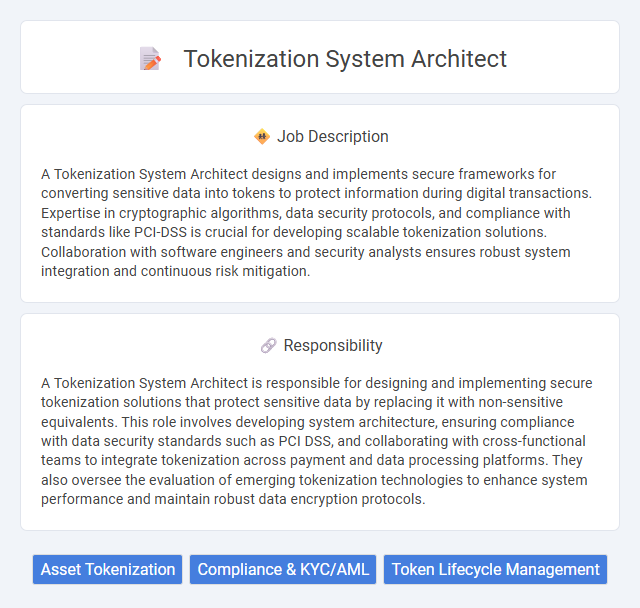
A Tokenization System Architect designs and implements secure frameworks for converting sensitive data into tokens to protect information during digital transactions. Expertise in cryptographic algorithms, data security protocols, and compliance with standards like PCI-DSS is crucial for developing scalable tokenization solutions. Collaboration with software engineers and security analysts ensures robust system integration and continuous risk mitigation.
Candidates with a strong background in software architecture, cryptography, and secure data handling are likely suitable for a Tokenization System Architect role due to the technical complexity involved. Individuals who excel under conditions that demand meticulous attention to detail and an ability to foresee security vulnerabilities may find this job particularly fitting. Those lacking experience in secure payment systems or data protection compliance might face challenges adapting to the role's requirements.
Qualification
A Tokenization System Architect must have extensive experience in cryptography, payment processing, and secure data management, typically requiring a bachelor's or master's degree in Computer Science, Information Security, or related fields. Proficiency in developing and implementing tokenization frameworks, compliance with PCI DSS standards, and strong knowledge of encryption algorithms and token vaults is essential. Expertise in cloud security, system integration, and risk assessment further strengthens qualifications for this role.
Responsibility
A Tokenization System Architect is responsible for designing and implementing secure tokenization solutions that protect sensitive data by replacing it with non-sensitive equivalents. This role involves developing system architecture, ensuring compliance with data security standards such as PCI DSS, and collaborating with cross-functional teams to integrate tokenization across payment and data processing platforms. They also oversee the evaluation of emerging tokenization technologies to enhance system performance and maintain robust data encryption protocols.
Benefit
A Tokenization system architect role likely brings significant benefits such as enhancing data security by replacing sensitive information with unique tokens, which reduces the risk of data breaches. This position probably improves compliance with industry standards and regulations, helping organizations avoid costly penalties. Expertise in this area may also drive operational efficiency by streamlining payment processes and enabling seamless integration across platforms.
Challenge
Tokenization system architect roles likely involve overcoming significant challenges related to securing sensitive data while maintaining high system performance and scalability. The architect must probably address issues of data privacy compliance and integration with various payment and financial platforms. The complexity of designing a flexible, robust tokenization framework that can adapt to evolving security threats may be a critical aspect of the job.
Career Advancement
A Tokenization System Architect role offers significant career advancement opportunities through mastering data security, cryptographic protocols, and scalable system design. Expertise in tokenization enhances your ability to lead cross-functional teams, contributing to roles such as Security Architect, Cloud Solutions Architect, or Chief Technology Officer. Developing skills in compliance standards like PCI DSS and emerging blockchain technologies positions professionals for strategic leadership in fintech and cybersecurity sectors.
Key Terms
Asset Tokenization
Designing and implementing asset tokenization systems involves creating secure blockchain frameworks that convert real-world assets into digital tokens, enabling fractional ownership and enhanced liquidity. Expertise in smart contract development, cryptographic security measures, and interoperability standards such as ERC-20 or ERC-721 is essential for ensuring robust and compliant token ecosystems. Collaboration with financial institutions and regulatory bodies is crucial to align the tokenization platform with evolving legal requirements and market needs.
Compliance & KYC/AML
Tokenization system architects design secure frameworks that ensure data privacy while complying with global regulatory standards such as GDPR, PCI DSS, and PSD2. They integrate advanced KYC (Know Your Customer) and AML (Anti-Money Laundering) protocols to detect and prevent fraudulent activities, enhancing transaction transparency and risk management. Expertise in cryptographic techniques and secure token lifecycle management is essential for maintaining compliance and safeguarding sensitive financial information.
Token Lifecycle Management
Token Lifecycle Management is critical in a Tokenization System Architect role, ensuring secure generation, storage, rotation, and deactivation of tokens throughout their lifecycle. Expertise in designing scalable token vaults and implementing robust encryption standards supports compliance with PCI DSS and minimizes data breach risks. Proficiency in integrating tokenization with payment gateways and managing token mapping enhances transaction security and operational efficiency.
 kuljobs.com
kuljobs.com